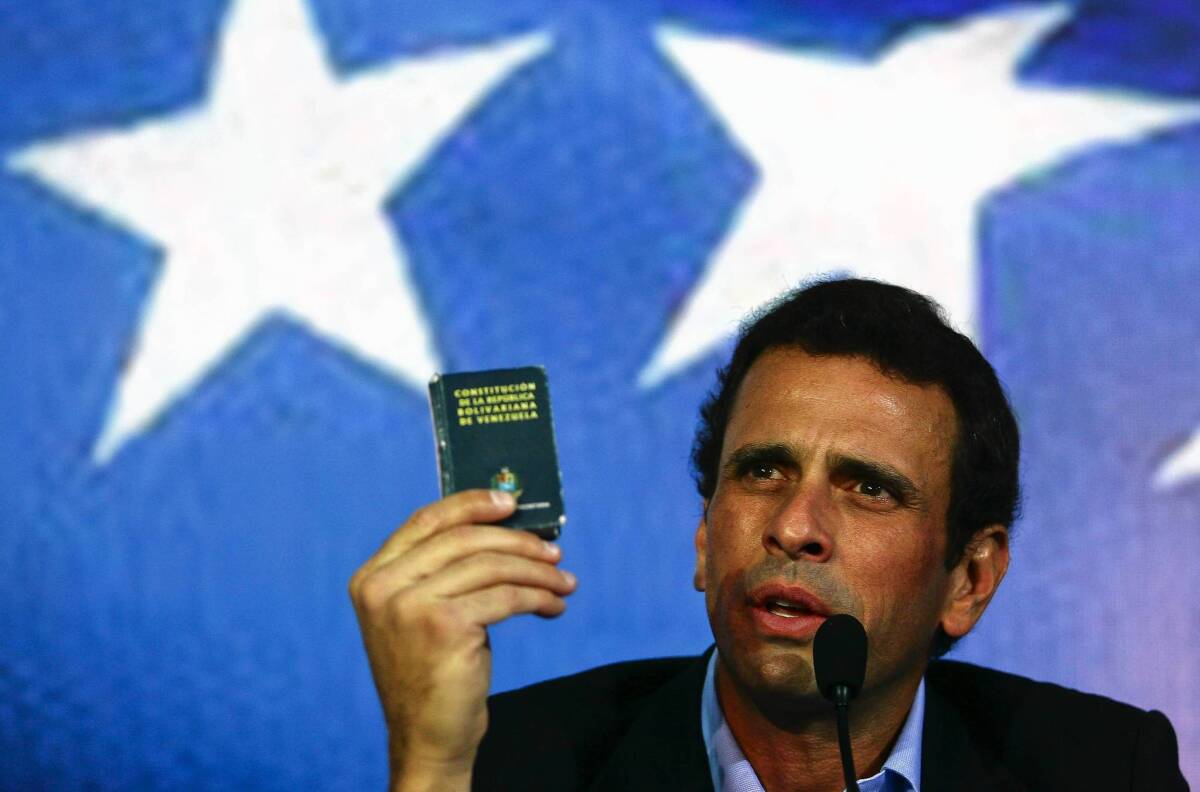Venezuela opposition leader will run against interim president

CARACAS, Venezuela — Opposition leader Henrique Capriles agreed Sunday to run against interim President Nicolas Maduro in an election to determine Hugo Chavez’s successor, but accused the government of “shameful” and unconstitutional maneuvers to undercut his chances.
Capriles, 40, ran unsuccessfully against Chavez as the opposition’s unity candidate in October, losing by 10 percentage points. He was reelected governor of Miranda state in December — the same month Chavez traveled to Cuba for his fourth cancer surgery in less than two years and anointed Maduro his political heir.
Chavez died of cancer last week. Maduro was sworn in Friday as “president in charge.”
“I say to the people of Venezuela, I will fight for all of you,” Capriles said at a televised news conference in suburban Caracas. “Nicolas, I will not leave the way open for you. I will fight for every vote, whatever the cost.”
On Saturday, the Supreme Court announced that the special presidential election will be held April 14. All interested politicians must announce their candidacies by Monday. Maduro told a Communist Party gathering in Caracas, the capital, on Sunday that he will formally file candidacy papers on Monday.
Capriles said he accepted the opposition parties’ nomination knowing his candidacy was a long shot given what he described as the Chavista government’s illegal decisions to “rig the game.”
He singled out the Supreme Court’s decision to allow Maduro to run for president while serving as “president in charge,” enabling him to use his high office to his advantage during the five-week campaign. He bitterly attacked Defense Minister Diego Molero’s declaration last week that the armed forces’ “mission” is to elect Maduro.
“All this is to make it as difficult for me as possible, for me to lose heart,” Capriles said. “But I will fight — not to be president, but so that Venezuela moves forward.”
The strength of Chavismo was evident last week in the long lines of the faithful waiting to view Chavez’s body lying in state at the Venezuelan Military Academy. Chavez’s political potency was proved not only in his October election victory but also in December, when the opposition lost five of the eight governorships it had held.
Constitutional experts have questioned Supreme Court rulings that give Maduro the right to be interim president despite language in the charter that expressly requires politicians to resign from public office before running, unless they are seeking reelection.
Moreover, the constitution stipulates that the president of the National Assembly assume the reins of power after a president dies until an election can be held, to avoid giving an interim leader such as Maduro an unfair advantage.
“It’s clear that the constitutional interpretations of the Supreme Court are not objective and form part of an integrated strategy,” said Armando Rodriguez Garcia, a constitutional law expert at the Central University of Venezuela law school in Caracas. “They reaffirm the subordinated nature of the judges to a political project, more than to a state function.”
Polls before Chavez’s death showed Capriles losing to Maduro by 10 to 15 percentage points in a then-hypothetical contest. But Capriles has proved a tough campaigner and has beaten two Chavez confidants in previous elections.
Analysts said Capriles had little choice but to accept the nomination because he is the only opposition candidate known nationally.
“I admire Capriles for agreeing to run in an election in which he is a clear underdog and has little time to turn that around,” said David Smilde, a sociologist at the University of Georgia and a close follower of Venezuelan politics.
Kraul and Mogollon are special correspondents.
More to Read
Sign up for Essential California
The most important California stories and recommendations in your inbox every morning.
You may occasionally receive promotional content from the Los Angeles Times.










